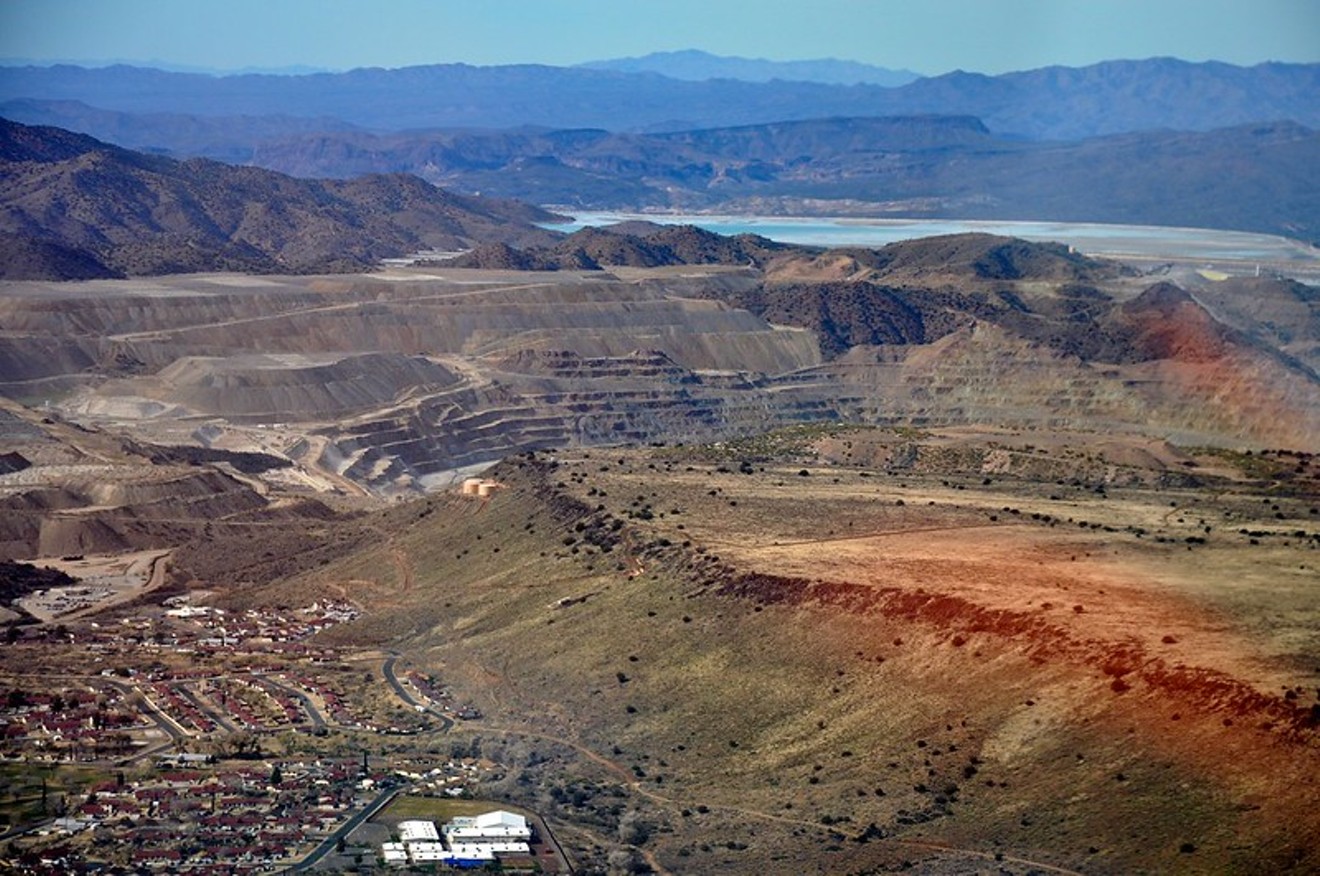The Arizona State Land Department this month sold nearly 17,000 acres of pristine desert land to Freeport-McMoRan, a Phoenix-based international mining company, which plans to use the property to store waste from its Bagdad copper mine.
The company purchased the land for about $13.5 million as the sole bidder during a January 6 auction. According to a document posted publicly prior to the sale, Freeport-McMoRan plans to use the site for a "tailings storage facility," referring to the often-toxic, sludge-like byproduct of mining. The purchase stands to essentially double the size of Freeport-McMoRan's mining operations in Bagdad, which, according to the town's website, accounts for roughly 20 percent of the company's North American copper production.
The plat equals roughly 25 square miles — larger than the island of Manhattan.
It is nearly seven times the size of a pending land acquisition by a British-Australian company for a mining operation near Superior. That project, Resolution Copper, would involve extracting copper from beneath Oak Flat, an area that Native American opponents consider sacred, and until a land swap, was protected from mining.
Yet whereas Resolution Copper's plans to conduct mining operations on 2,400 acres of federal land triggered a years-long process involving stakeholder meetings and public hearings, studies and news articles, protests from the San Carlos Apache tribe, and a rider on a defense spending bill from the late Senator John McCain, Freeport-McMoRan's deal with the state of Arizona slipped by when few were paying attention.
But the recent transaction between the copper corporation and the state did not go entirely unnoticed.
Joe Trudeau, an ecologist who serves as Southwest Advocate for the Center for Biological Diversity, followed the deal for about a year before the sale went through. He said Freeport-McMoRan's mining waste plan poses risks to habitats for countless Sonoran Desert species, as well as water sources in the area like streams and aquifers.
Because the proposed waste site was managed by the Land Department, biologists and other researchers have not been able to survey the property to determine what endangered species may be residing in the area. Trudeau said that it is likely that some common species live there, including mule deers, bobcats, mountain lions, black bears, and rattlesnakes.
"That is habitat that will be lost for the rest of our lives and probably hundreds of years into the future, if not forever," Trudeau said. "This is a tremendous impact of almost unprecedented scale in Arizona."
As with most large mining operations, Freeport-McMoRan's waste storage proposal also raises concerns of water contamination. The Bagdad area, which is about 65 miles west of Prescott, sits close to several watersheds, including for the Santa Maria River, the Big Sandy River, and the Bill Williams River.
Freeport-McMoRan has a track record of water contamination. In 2008, the Arizona Department of Air Quality fined the company $100,000 after finding that it discharged a "highly corrosive acidic solution" into a publicly accessible creek, exceeding the state's quality standards for copper, zinc, and acidity. In 2012, Freeport-McMoRan reached a $6.8 million settlement with the Department of the Interior for contaminating rivers, streams, and aquifers near its mine in Morenci. The federal government also determined that the company endangered migratory birds in the region. In 2017, an audit in Indonesia calculated that the company's mining operations in the southeast Asian country had caused environmental damage worth $13.25 billion.
Freeport-McMoRan did not respond to request for comment. Nor did the Arizona State Land Department.
The Bagdad area has already seen at least one serious case of mining contamination, though it came from a separate company. In 2017, Attorney General Mark Brnovich pressed charges against Bagdad Hillside mining company for leaking millions of gallons of arsenic into a public creek that residents sometimes used as a swimming hole. The company was forced to pay $2.7 million in fines over the pollution.
Opponents of Freeport-McMoRan's proposal have few options for recourse.
Because the case involves a sale from the state land trust to a private company, rather than a transaction involving federal land like Resolution Copper's project, the deal was subject to fewer bureaucratic hurdles.
And a recent rollback of Clean Water Act regulations by President Trump's administration removed protections for smaller bodies of water, including those found in the Bagdad-area property, like seasonal rivers, groundwater, and "ephemeral streams" that only flow after rain. According to Trudeau, the Trump decision took away environmentalists' sole avenue for challenging Freeport-McMoRan's proposed tailings site.
"We lost the only tool we have to prevent this tremendous loss of desert landscape," Trudeau said. "Our hands our virtually tied."
The State Land Department, established in 1915, oversees about 9.2 million acres of Arizona trust lands. While other governmental land agencies, such as the U.S. Forest Service or Arizona State Parks, have a conservation mandate, the Land Department's only purpose is generating revenue for schools, prisons, and other public facilities.
And the agency has recently been on a selling spree. The Land Department sold more than $330 million in land in 2018 and generated $216 million last year, compared to the $44 million it sold in 2017. In addition to selling land, the department also leases its trust property for purposes like rights-of-way and grazing.
Freeport-McMoRan frequently tops the list of Arizona's most profitable companies. The company made $2.6 billion in profits in 2018.
[
{
"name": "Air - MediumRectangle - Inline Content - Mobile Display Size",
"component": "18478561",
"insertPoint": "2",
"requiredCountToDisplay": "2"
},{
"name": "Editor Picks",
"component": "16759093",
"insertPoint": "4",
"requiredCountToDisplay": "1"
},{
"name": "Inline Links",
"component": "17980324",
"insertPoint": "8th",
"startingPoint": 8,
"requiredCountToDisplay": "7",
"maxInsertions": 25
},{
"name": "Air - MediumRectangle - Combo - Inline Content",
"component": "16759092",
"insertPoint": "8th",
"startingPoint": 8,
"requiredCountToDisplay": "7",
"maxInsertions": 25
},{
"name": "Inline Links",
"component": "17980324",
"insertPoint": "8th",
"startingPoint": 12,
"requiredCountToDisplay": "11",
"maxInsertions": 24
},{
"name": "Air - Leaderboard Tower - Combo - Inline Content",
"component": "16759094",
"insertPoint": "8th",
"startingPoint": 12,
"requiredCountToDisplay": "11",
"maxInsertions": 24
}
]












